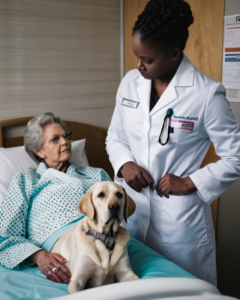 Nurse Practitioners (NPs) represent a pivotal component of the healthcare delivery system, providing a blend of nursing and healthcare services that emphasize both care and cure. As advanced practice registered nurses (APRNs), NPs have expanded responsibilities that include diagnosing and managing patients’ health issues, as well as implementing healthcare plans. This profession originated in the 1960s in response to a shortage of physicians and the need for high-quality healthcare services in underserved areas. Over the decades, the role of NPs has evolved significantly, driven by healthcare reforms and a growing recognition of their ability to provide comprehensive and cost-effective care.
Nurse Practitioners (NPs) represent a pivotal component of the healthcare delivery system, providing a blend of nursing and healthcare services that emphasize both care and cure. As advanced practice registered nurses (APRNs), NPs have expanded responsibilities that include diagnosing and managing patients’ health issues, as well as implementing healthcare plans. This profession originated in the 1960s in response to a shortage of physicians and the need for high-quality healthcare services in underserved areas. Over the decades, the role of NPs has evolved significantly, driven by healthcare reforms and a growing recognition of their ability to provide comprehensive and cost-effective care.
Today, Nurse Practitioners are essential in delivering primary and specialized care to diverse populations, often serving as patients’ primary healthcare providers. They work across various settings, including hospitals, private practices, schools, and clinics, bringing a holistic approach to patient care that focuses on health promotion, disease prevention, and health education. The journey to becoming an NP involves rigorous education and clinical training, preparing them to address a wide range of health issues, from acute conditions to chronic diseases. As healthcare continues to evolve, the role of Nurse Practitioners is set to become even more critical, highlighting their importance in meeting the challenges of modern healthcare delivery.
The Role and Scope of Practice of Nurse Practitioners
Nurse Practitioners serve as a linchpin in the healthcare system, offering a wide array of services that span health promotion, disease prevention, diagnosis, and management of acute and chronic diseases. Their role is characterized by a patient-centered approach to care, which emphasizes the health and well-being of individuals across their lifespan. NPs are authorized to perform comprehensive physical assessments, order and interpret diagnostic tests, initiate and manage treatment plans, prescribe medications, and provide education and counseling to support healthy lifestyle choices.
Scope of Practice
The scope of practice for Nurse Practitioners varies significantly by state and country, influenced by local laws and regulations. In some regions, NPs enjoy full practice authority, allowing them to operate independently without physician oversight. This autonomy enables them to open their practices, make independent clinical decisions, and serve as primary care providers. In other areas, NPs must collaborate with physicians, working under a regulated scope of practice that may limit their prescriptive authority or require physician supervision for certain medical decisions.
Specializations Within the Profession
Nurse Practitioners can specialize in a range of fields, reflecting the diverse needs of the populations they serve. Some of the common specializations include:
-
- Family Nurse Practitioner (FNP): FNPs provide comprehensive family-focused care, serving patients of all ages, from infants to the elderly.
-
- Pediatric Nurse Practitioner (PNP): PNPs specialize in the care of children, focusing on preventive care, diagnosis, and treatment of pediatric illnesses.
-
- Adult-Gerontology Nurse Practitioner (AGNP): AGNPs specialize in caring for adults, including the elderly, covering acute, chronic, and preventive healthcare needs.
-
- Psychiatric Mental Health Nurse Practitioner (PMHNP): PMHNPs provide mental health services, including psychiatric evaluations, therapy, and medication management.
-
- Women’s Health Nurse Practitioner (WHNP): WHNPs specialize in women’s health, focusing on reproductive, obstetric, and gynecological health.
Each specialization requires additional education and clinical experience, enabling NPs to provide expert care tailored to specific patient populations.
The role and scope of practice of Nurse Practitioners underscore their versatility and adaptability within the healthcare system. By providing high-quality, patient-centered care, NPs play a crucial role in enhancing healthcare accessibility, improving patient outcomes, and addressing the evolving needs of diverse populations. Their ability to practice independently, or in collaboration with other healthcare professionals, makes them invaluable in the quest to meet the growing demand for healthcare services globally.
Educational Pathways to Becoming a Nurse Practitioner
Becoming a Nurse Practitioner (NP) is a journey that entails rigorous academic preparation and hands-on clinical training. The path to this advanced practice role is structured to equip nurses with the expertise needed to provide comprehensive care across various healthcare settings. Here’s an overview of the educational and certification requirements for aspiring Nurse Practitioners.
Undergraduate Education
The first step toward becoming an NP is to obtain a Bachelor of Science in Nursing (BSN) degree. This undergraduate program offers a comprehensive foundation in nursing, covering key areas such as anatomy, physiology, microbiology, and pharmacology, alongside clinical rotations in different healthcare settings. The BSN degree not only prepares nurses with the practical skills needed for patient care but also lays the groundwork for advanced study.
Graduate Education
After completing a BSN degree, aspiring NPs must pursue graduate-level education through a Master of Science in Nursing (MSN) or a Doctor of Nursing Practice (DNP) program. MSN programs typically focus on advanced clinical skills, patient assessment, and pharmacology, along with a specialization area such as family practice, pediatrics, or psychiatric-mental health. DNP programs, on the other hand, offer the highest level of nursing practice education, emphasizing clinical practice-oriented leadership and advanced management skills. Both MSN and DNP programs require students to complete a significant amount of clinical hours in their specialty area, ensuring they gain the experience needed to practice independently.
Licensure and Certification
Upon completing their graduate education, NPs must obtain licensure as Registered Nurses (RN) in their state, if they have not already done so after their BSN. The next step involves passing a national certification exam in their chosen specialty area, offered by recognized professional bodies such as the American Nurses Credentialing Center (ANCC) or the American Association of Nurse Practitioners (AANP). Certification is essential for practice as an NP and must be maintained through continued education and clinical practice hours.
Continuing Education
The field of healthcare is ever-evolving, and NPs are required to engage in lifelong learning to keep abreast of the latest developments in medical science, healthcare technology, and clinical practices. Continuing education (CE) is a requirement for maintaining certification and licensure, and it enables NPs to expand their knowledge, refine their skills, and adapt to the changing healthcare landscape. CE opportunities include workshops, conferences, seminars, and advanced courses related to their specialty.
The Clinical Training of Nurse Practitioners
Clinical training is a cornerstone of the Nurse Practitioner education, providing the practical experience necessary to deliver high-quality, patient-centered care. This segment of their education allows aspiring NPs to apply theoretical knowledge in real-world settings, under the supervision of experienced clinicians.
Clinical Requirements
Both MSN and DNP programs have specific clinical requirements that students must fulfill to graduate. These requirements typically involve completing a set number of clinical hours—ranging from 500 to over 1,000—depending on the program and specialty. Clinical rotations take place in diverse healthcare environments, such as hospitals, primary care clinics, and specialty practices, offering students exposure to a broad spectrum of patient care scenarios.
Hands-on Experience
During clinical rotations, NP students engage in hands-on patient care, gradually taking on more responsibilities as they progress. They learn to conduct comprehensive patient assessments, develop and manage treatment plans, perform diagnostic and therapeutic procedures, and prescribe medications. This immersive experience is crucial for developing the competence and confidence needed to practice independently.
Challenges and Opportunities
Clinical training presents challenges, including adapting to the fast-paced environment of healthcare settings, managing complex patient cases, and navigating the dynamics of interdisciplinary teams. However, these challenges are accompanied by invaluable learning opportunities. Students learn to make critical decisions, communicate effectively with patients and healthcare professionals, and deliver empathetic, evidence-based care.
The mentorship received during clinical training is another critical component. Experienced practitioners guide NP students, offering insights drawn from years of clinical practice. This mentorship is instrumental in shaping the professional ethos of future NPs, emphasizing the importance of continuous learning, ethical practice, and patient advocacy.
Clinical training equips Nurse Practitioners with the skills and knowledge necessary to address the healthcare needs of diverse populations. It prepares them to be adaptable, resilient, and responsive to the challenges of modern healthcare delivery, ensuring they are well-positioned to make a significant impact on patient outcomes and the broader healthcare system.
Nurse Practitioners in the Healthcare System
Nurse Practitioners (NPs) are integral to the healthcare system, playing a vital role in expanding access to care, improving patient outcomes, and reducing healthcare costs. Their unique blend of clinical expertise and personalized patient care enables them to meet a wide range of healthcare needs, from preventive health services to the management of complex chronic conditions.
Role in Primary Care
NPs are often the primary care providers for many patients, particularly in underserved or rural areas where access to physicians may be limited. They provide comprehensive care that includes health assessments, diagnosing illnesses, prescribing medications, and managing overall patient care. NPs in primary care focus on health promotion, disease prevention, and patient education, aiming to improve long-term health outcomes through proactive management of health and wellness.
Impact on Patient Outcomes
Research has consistently shown that NPs provide care that is comparable in quality to that of physicians, with patient outcomes such as satisfaction, hospital readmission rates, and mortality rates being similar or better. NPs tend to spend more time in patient consultations, offering education and counseling that support healthier lifestyle choices. This patient-centered approach, coupled with the emphasis on preventive care, contributes significantly to positive patient outcomes.
Specialty and Acute Care Roles
Beyond primary care, NPs specialize in areas such as cardiology, oncology, psychiatric/mental health, and emergency care, among others. In these roles, NPs bring advanced clinical skills to manage specific health conditions, perform procedures, and provide specialized care. In acute settings, NPs work alongside physicians and other healthcare professionals in hospitals, intensive care units, and emergency rooms, playing critical roles in patient care teams.
Collaborative Practice Models
Collaborative practice models involving NPs, physicians, and other healthcare professionals are increasingly common, reflecting a team-based approach to healthcare. These models leverage the strengths and expertise of each professional to provide comprehensive, coordinated care. Collaboration enhances patient care quality, with NPs contributing significantly to the team through their expertise in disease management, patient education, and health promotion.
Legal and Ethical Considerations for Nurse Practitioners
The practice of Nurse Practitioners is governed by a complex framework of legal and ethical considerations that ensure the delivery of safe, competent, and ethical care. NPs must navigate these considerations throughout their careers, balancing professional autonomy with collaborative practice requirements and ethical principles.
Legal Scope of Practice
The legal scope of practice for NPs varies by state and country, defining what NPs are authorized to do. This includes prescribing medications, ordering diagnostic tests, and performing certain procedures. Some jurisdictions grant full practice authority, allowing NPs to practice independently, while others require a collaborative agreement with a physician. NPs must be familiar with the regulations governing their practice in their jurisdiction to ensure compliance and provide the highest standard of care.
Prescriptive Authority
Prescriptive authority is a critical component of NP practice, enabling them to prescribe medications and manage patient treatment plans. This authority also varies by location, with some states allowing full prescriptive rights and others imposing restrictions. NPs must adhere to federal and state laws regarding prescription drugs, including controlled substances, and stay informed about changes in prescribing guidelines.
Ethical Considerations
NPs face various ethical considerations, such as maintaining patient confidentiality, obtaining informed consent, and navigating end-of-life care decisions. They must also address issues of health equity and access to care, striving to provide ethical and unbiased care to all patients. Ethical practice requires NPs to engage in continuous reflection, consultation with colleagues, and adherence to professional codes of ethics.
Advocacy and Professional Involvement
NPs play an important role in advocating for healthcare policies that improve patient access to care, enhance healthcare quality, and support the NP profession. Professional involvement in organizations such as the American Association of Nurse Practitioners (AANP) and the International Council of Nurses (ICN) allows NPs to contribute to policy development, professional standards, and public health initiatives. Advocacy and leadership in these areas are essential for advancing the NP role and ensuring that healthcare systems meet the needs of diverse populations.
Challenges Facing Nurse Practitioners
Nurse Practitioners (NPs) face several challenges that can impact their practice and the broader healthcare delivery system. These challenges not only affect NPs but also have implications for patient care, healthcare accessibility, and the overall effectiveness of the health system.
Scope of Practice Limitations
One of the most significant challenges for NPs is the variation in scope of practice regulations across different states and countries. Restrictions on NPs’ ability to practice to the full extent of their training and education can limit patient access to care, especially in rural or underserved areas where NPs often serve as primary care providers. Advocacy for uniformity in practice authority is ongoing, with many professional organizations working to expand full practice authority nationwide.
Recognition and Reimbursement
Despite the proven quality and effectiveness of care provided by NPs, they sometimes face challenges in recognition and reimbursement. In some healthcare settings, NPs are not recognized as primary care providers, impacting their ability to serve patients independently. Additionally, reimbursement rates for NP services, particularly from insurance companies and Medicare, can be lower than those for services provided by physicians, affecting the financial viability of NP practices.
Educational and Training Demands
The path to becoming an NP is rigorous, requiring advanced education and clinical training. The demand for NPs is growing, but the capacity of educational institutions to train sufficient numbers of NPs to meet this demand is limited by faculty shortages, clinical placement challenges, and financial barriers. Ensuring access to high-quality NP education and training programs is critical for the continued growth of the profession.
Keeping Pace with Healthcare Advancements
The rapid pace of advancements in healthcare technology, treatments, and patient care models requires NPs to engage in continuous learning and professional development. Staying abreast of these changes, while managing the demands of clinical practice, can be challenging. Lifelong learning is essential for NPs to provide the highest standard of care and to adapt to the evolving healthcare landscape.
The Future of the Nurse Practitioner Profession
The future of the Nurse Practitioner profession is bright, with significant opportunities for growth, innovation, and expanded impact on healthcare delivery. Several trends and developments are shaping the trajectory of the NP role in the healthcare system.
Increased Demand for NPs
The demand for NPs is projected to continue to grow in the coming years, driven by an aging population, an increase in chronic health conditions, and a focus on preventive care. NPs are well-positioned to meet this demand, providing high-quality, patient-centered care across various settings. Their ability to serve as primary care providers, particularly in underserved areas, will be crucial in addressing healthcare accessibility and workforce shortages.
Technological Advancements and Telehealth
Technological advancements, including telehealth and digital health platforms, are transforming the way NPs deliver care. The expansion of telehealth services, accelerated by the COVID-19 pandemic, has demonstrated the potential for remote care to improve access and convenience for patients. NPs are adapting to these technologies, using them to enhance patient engagement, monitor health conditions remotely, and provide virtual consultations.
Evolving Healthcare Policies
Healthcare policies, including those related to scope of practice, reimbursement, and telehealth, will continue to evolve, impacting the NP profession. Advocacy efforts by NPs and professional organizations will be critical in shaping policies that support the full utilization of NPs, improve healthcare access, and recognize the value of NP-provided care.
Emphasis on Interprofessional Collaboration
The future of healthcare emphasizes interprofessional collaboration, with NPs playing a central role in multidisciplinary healthcare teams. Collaborative practice models, which leverage the strengths and expertise of various healthcare professionals, will enhance patient care quality and efficiency. NPs’ holistic approach to patient care, combined with their clinical expertise, makes them invaluable team members in these collaborative settings.
Conclusion
Nurse Practitioners are a vital force in healthcare, offering a unique blend of clinical expertise and compassionate care that addresses the health needs of diverse populations. Despite facing challenges related to scope of practice, recognition, and the demands of an evolving healthcare landscape, NPs continue to demonstrate their value and impact. The future of the NP profession is promising, with opportunities for growth, technological innovation, and enhanced patient care. As the demand for healthcare services increases, NPs will play an increasingly important role in providing accessible, high-quality care. Their commitment to lifelong learning, patient advocacy, and professional excellence ensures that NPs will remain at the forefront of healthcare delivery, meeting the challenges of the 21st century with skill, dedication, and compassion.
This comprehensive exploration of the Nurse Practitioner profession highlights the crucial role NPs play in the healthcare system, the challenges they face, and the bright future that lies ahead. As healthcare continues to evolve, the contributions of NPs will undoubtedly be central to achieving high-quality, patient-centered care for all.





